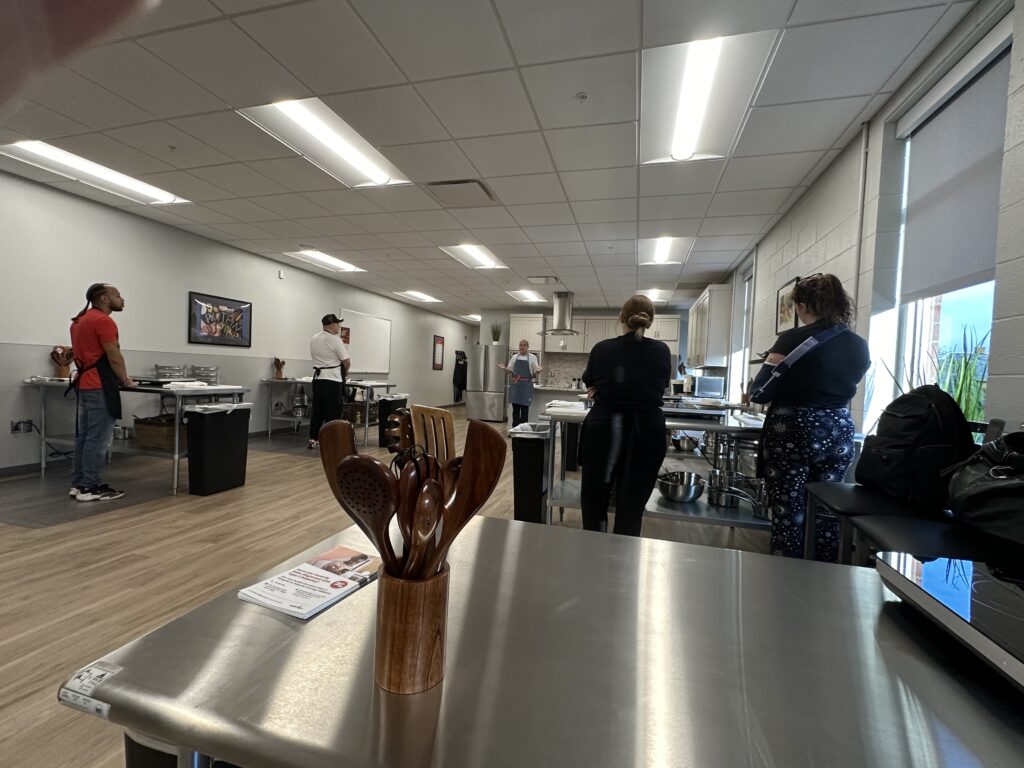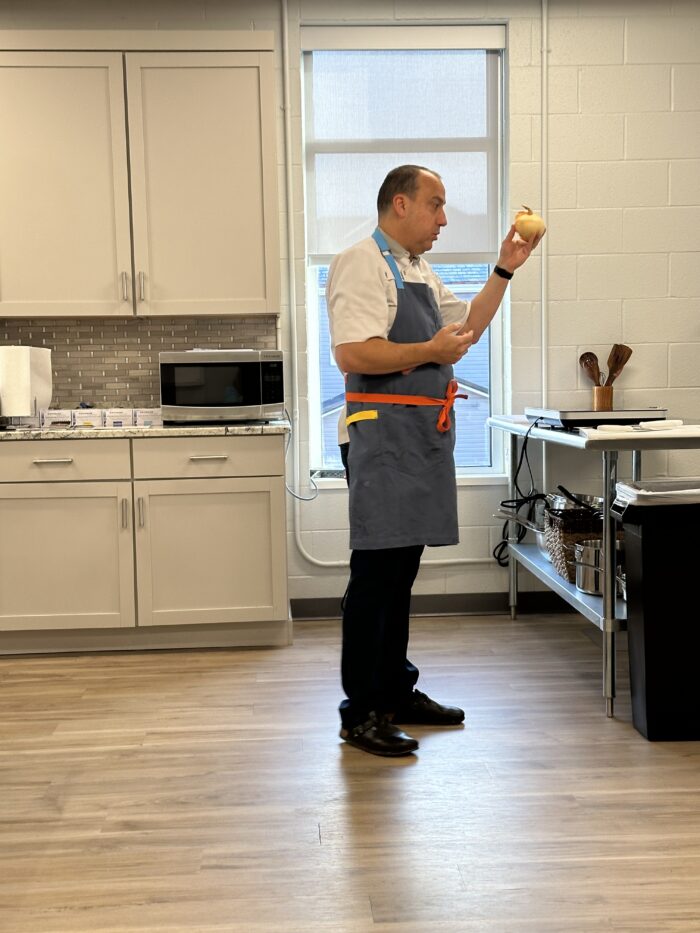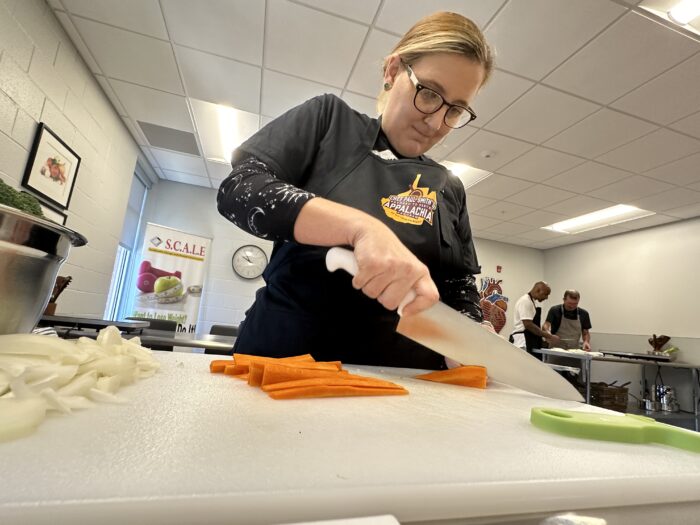Cash Reward Offered For Information On Vandalism In The New River Gorge National Park
$1,000 is being offered for tips that lead to the conviction of those responsible for the defacement of the Long Point Trail.
Continue Reading Take Me to More News
Local chef Paul Smith was in rare form recently, teaching basic kitchen skills to a small group of West Virginians who are hoping their luck is about to change.
At the heart of his message: there are plenty of rules in the kitchen – and in life. But most mistakes can be fixed with a little hard work.
“You can overcook the crap out of green beans,” he said. “You just gotta add some bacon fat and stuff to it, and then it’s, then it’s country style.”
His students are in the first of four cohorts planned for the state’s first ever “Prepped To Serve” program.

Ten applicants – some in recovery, others with felony convictions or struggling to find work – were chosen for the program which started in October and paired them with Smith, the state’s only James Beard award winner to date.
Now they’re about to graduate with training followed by two months’ worth of paid restaurant experience under their belts, thanks to Smith.
He knows a lot about cooking – but he also understands some of the challenges his cohort has faced.
“I had a private chef business. I was a corporate chef for a food service company, Buzz food service. I was making good money. I had a house, I had a car, and I was literally on the brink of losing everything,” he said.
It’s been five years since Smith confronted his addiction to alcohol, which flourished for years in an industry known for its tolerance of substance abuse. Since then, he’s found a level of success he never expected.
He’s opened his first restaurant – which is thriving – and is now an owner or partner in more than half a dozen more. He’s also been chosen as finalist in the elite national James Beard culinary awards for two years in a row, and this year took first place in the Best Chef Southeast category.
“That’s North Carolina, South Carolina, Georgia, Kentucky, Tennessee, West Virginia. Think about how many big cities are in that market. Think about what an accomplishment that is for a small state and a small town like Charleston, West Virginia,” Smith said.
He is acutely aware that his is a story of success that might have never been.
“I know in my heart that I wouldn’t be here. Number one, I would be dead. I was drinking myself to death. I was doing other things after you drink and you lose those inhibitions,” he said.
He took control. And five years later, he takes that control again – every single day.
“So what I do is come into the restaurant. I sit at the bar. I literally look at all the bottles of alcohol, and I basically give them a mental middle finger and say, you know, ‘You’re not going to beat me today,’” he said.
In a state and a region in the midst of a massive addiction crisis, Smith eventually realized that he wanted to do something more than focus on his own recovery. He joined forces with West Virginia Health Right – a charitable clinic that offers free healthcare to the working poor.
Angie Settle is the CEO. She says mental health treatment and recovery are often affected by the cost of health insurance.
“A lot people are faced with, ‘Do I quit my job so I can qualify for Medicaid and get these thousands of dollars for the medications that I need every month? Or do I take this job and then maybe go without care because I can’t afford the insurance?’” she said.
Together the chef and the CEO put together the Prepped To Serve program which offers a month’s worth of culinary training and guarantees a paid job with oversight for two months. After that, success depends on each of the students.
“This is like a trampoline Jumpstart is basically what this is. They’ll come out with the food handler certificate, that they completed a program with the James Beard award winning chef, and can basically take that anywhere,” Settle added.
That was appealing to people like John.
“Let’s see, just graduated drug court. I’ve got about 21 months sober. And I’ve been cooking there at the fellowship home for the past year,” he said. “I think a huge part of sobriety is finding something you’re passionate about. And I’m very passionate about cooking. You know, I found a purpose which I never had.”
Gil has an old felony conviction he said made it hard for him to find work.
“I just couldn’t find a job. I applied everywhere. That ‘felony’ underneath my name,” said, shaking his head. “Now I don’t even have, like, a minor traffic ticket or anything. And I want to learn, get new skills, because maybe this might be my way.”
Lisa told the class she’s looking for a life change.

“I have three kids. I’m not in recovery from substances, but kind of life recovery,” she said. “I worked with [the] restaurant industry a lot when I was younger. And then Covid happened, and I kind of got put back in there, and it just kind of reignited my love for it.”
The program is funded through a WorkForce West Virginia grant through the Division of Commerce. Former Commerce Secretary James Bailey helped make the arrangements.
“It’s a lot easier for a small business to take a chance on somebody who might be needing their second chance when they are coming out of a program like that, as opposed to right off the street,” Bailey said.
“What it’ll do for a workforce is exciting to me, because there’s a gap there for our small restaurant businesses in filling their workforce needs. It’s a challenge for restaurants. It’s been cited by some of the ones that have closed down as one of their challenges,” he added.
If it seems risky to take participants – some in recovery – and place them in a restaurant position, Chef Paul said his restaurants and many others have shifted focus from the old days when substance use and sometimes abuse often took place on the job.
“Of course, this is a stressful business, and with that stress comes excuses, right? ‘Oh, my God, I had a tough day, I should have a drink.’ ‘Oh, I had a great day. I should have a drink.’ ‘Oh, someone yelled at me.’ ‘Someone didn’t like that dish.’ ‘Someone loved that dish.’ There’s always a reason or an excuse to figure out a way to do whatever we were doing.
Removed from that environment, participants in the very first Prepped To Serve cohort are hopeful they can find a new level of success, just like their celebrity chef instructor did.
The program is now accepting participants for its second cohort which will begin on Tuesday, January 7, 2025. For more information visit Prepped to Serve Appalachia – West Virginia Health Right.